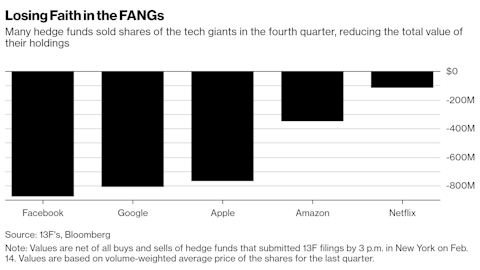Antitrust Not Needed in the Tech Space?: It was long argued that antitrust wasn’t necessary in the tech space because of the ease with which startups could penetrate the market with a new service or technology and supplant existing tech giants.
Google itself was often cited as an example for being able to attain a dominant position in search despite competing search engines from other internet giants of the day, including Microsoft Corporation (NASDAQ:MSFT). However, just because some startups have had success in tough environments shouldn’t preclude regulation and oversight from being necessary, as if every company should just have to fend for itself against bigger, ruthless competition because a few others managed to do so and succeed.
What also isn’t as widely known in the Google case is how much of an effect that Microsoft Corporation (NASDAQ:MSFT)’s own antitrust battles had on the company’s ruthlessness. Even though Microsoft won the antitrust battle against the courts, it ultimately lost the war, becoming a company that was afraid to step on anyone’s toes for fear of regulatory reprisal.
Is the Tide Turning Against Tech Giants?: Such reprisal had been absent in recent years, as the Obama administration did little to curtail the rapid growth of several tech companies, including Apple Inc. (NASDAQ:AAPL), Facebook Inc (NASDAQ:FB), and Amazon.com, Inc. (NASDAQ:AMZN), who together with Google and Microsoft control the majority of online news, shopping, and advertising and are collectively valued at trillions of dollars, while all ranking among the 15 most popular stocks among hedge funds.
In the EU, Google was hit with a $2.7 billion fine last year and was ordered to stop giving itself an illegal advantage over other comparison shopping services. The EU has also embarked on antitrust investigations of Facebook Inc (NASDAQ:FB) and other companies, as well as looking into the tax practices of Apple Inc. (NASDAQ:AAPL) and Amazon.com, Inc. (NASDAQ:AMZN). The EU’s tough stance may serve to embolden the FTC, which has long had Google on its radar, as well as U.S lawmakers.
“Google’s conduct has resulted — and will result — in real harm to consumers and to innovation,” part of an internal FTC memo that was accidentally sent to The Wall Street Journal read.
Firm Antitrust Laws Needed to Foster Innovation: Some argue that Google’s activity isn’t directly harming consumers and therefore shouldn’t be regulated. However, it’s not a matter of how happy people are about the quality of Google’s Search engine, as Google itself seems to think is of prime importance. It’s about allowing competition to flourish and allowing consumers to make their own choices, not have a Search dictator control which sites or services can become popular, which is essentially what Google has become capable of, if it hasn’t already become just that.
People will say there are other search engines out there that one can use, that no one’s forced to use Google, but that’s entirely missing the point. The fact that some competition still exists doesn’t change the fact that Google now has monopolistic control over internet search that can and has been used against potential competition; competition which may have become even more popular than Google one day if it had a fair shot at reaching consumers online.
As Duhigg notes, antitrust is necessary for innovation and enforcing it shouldn’t even necessarily be about fairness. Even had Google played by the rules and still grown into a monopolistic entity, the need for it to be broken up would essentially be the same at this point. Because antitrust should be about promoting progress, something we as a society should always be aiming to achieve. When progress and innovation are allowed to be snuffed out by fearful competitors, whether directly or indirectly, we all lose out, our potential societal evolution held back.
It’s now a matter of seeing just how far U.S regulators will go as they finally take a closer, harder look at several growing tech monopolies, including Google.
“If Europe can prosecute Google, then we can as well,” William Kovacic, a law professor and former chairman of the FTC told Duhigg. “It’s just a question of willingness now.”
Hedge Fund Ownership of Alphabet Inc (NASDAQ:GOOGL): At the end of 2017, Google’s class A and C shares ranked as the fifth and sixth-most popular stocks among the hedge funds tracked by Insider Monkey’s database. 129 hedge funds were long Google’s class A shares, with 124 being long its class C shares. Those hedge funds owned a combined $34.8 billion of the company’s shares.
Several hedge funds own billion-dollar positions in Google, including Boykin Curry’s Eagle Capital Management ($1.71 billion), Ken Fisher‘s Fisher Asset Management ($1.16 billion), and Andreas Halvorsen’s Viking Global ($1.05 billion).
Disclosure: None





